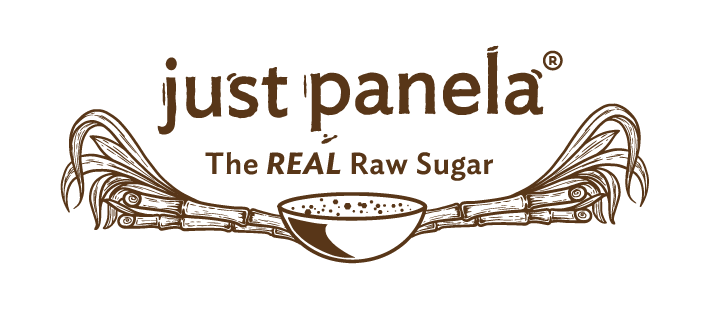What is Panela?
What is Panela?
Your Guide on How It’s Made and Its Benefits
It’s a raw organic sugar that’s made using traditional technology - and it’s the next big thing in sugar alternatives that you need to know about.
Amounting to almost all of the available agricultural land in the region, 240,000 hectares of the Cauca river valley in Colombia are dedicated to the cultivation of sugarcane.
Sugarcane can be used for the production of biofuel but, more often than not, its juice is processed into a type of organic raw sugar known as panela. This unrefined sugar is traditionally produced and consumed in Latin America, but it’s now making its way into the US as consumers search for alternatives to conventional sugar.
If you count yourself among the many smart consumers moving away from processed and refined foods, panela sugar hits all the right notes. Flavorful, aromatic, and sweet, it’s also sustainable, environmentally-friendly, and organic.
Read on as we answer: “what is panela?” and tell you everything you need to know about this sweet and simple sugar alternative.
What Is Panela?
Panela sugar is most commonly found across Latin America and parts of the Caribbean. In Colombia, for example, there are an estimated 350,000 sugar farmers and 18,500 crushing and milling facilities dedicated to sugarcane.
The majority of organic panela is made by cutting down the sugarcane by hand and kettle cooking it in small batches, the way it always has been. Using centuries-old methods that involve dehydrating the raw sugarcane juice over low levels of heat, the dried end product is then pressed into blocks and consumed in beverages and foods.
This traditional, small-scale production method lends itself to retaining higher amounts of the molasses contained within the sugarcane. It’s the molasses that lends panela sugar its distinct, lightly sweet flavor and aroma. At the same time, molasses contains naturally-occurring vitamins, minerals, and antioxidants that you won’t find in sugars that go through an industrial refining process.
Because it’s still produced using traditional technology and without industrial processing, panela isn’t just a better alternative in terms of your health, it’s also environmentally-friendly and sustainable. In many cases, you’ll find USDA certified organic panela that’s also fair-trade.
We’ll get into all of the panela sugar benefits in more detail below – but first, let’s find out how panela sugar is made and what sets it apart from your more conventional options.
Sugarcane fields in Valle del Cauca (Colombia)
How Is Sugar Made from Sugarcane?
Most conventional sugars – like the ones you buy at the grocery store – are known as centrifugal sugar products. “Centrifugal” refers to the process by which the sugar is produced. Refined sugars are processed through a machine that works like a spin dryer. The purpose of the machine is to separate the molasses from the sugar crystal.
By contrast, panela sugar is classified as a non-centrifugal sugar by the Food and Agriculture Organization of the United Nations. Non-centrifugal sugar products are part-processed so all or most of the natural molasses content is retained in the sugar. The molasses content is what contributes to the gold or dark brown coloring of these sugars. Because they’re less processed than refined sugars, non-centrifugal sugar products are considered more beneficial for human health and the environment.
Panela more specifically is obtained from evaporated sugarcane juice. It’s hand cut, transported to a mill, crushed, and kettle-cooked. The juice is then filtered for impurities and boiled down into a thick, syrup-like consistency.
The boiling removes the water content and the syrup is then poured into disks, blocks, and cone molds. These molds are how panela sugar is traditionally purchased but, in recent years, panela producers have created innovative techniques for pulverizing the panela. In free-flowing, fine, soft granules, panela is far easier to use in cooking, baking, and beverage-making.
Panela Sugar Benefits
Now that we’ve addressed “what is panela?” we can move on to all of the panela sugar benefits. Below we list each of the many benefits in more detail.
Great for Cooking, Baking, and Beverages
Organic panela is cut by hand, kettle cooked, and crafted in small batches using traditional methods and technology. Unlike refined sugars, panela produced in this way doesn’t go through any industrial collection or processing – and it’s that lack of machine processing that gives panela its unique flavor and aromas.
Panela can be used as a 1:1 replacement for brown, white, and turbinado sugar in all kinds of beverages, baking, and cooking. It’s a welcome alternative in baking and other food products when you’re looking for a textural component with hints of caramel, molasses, raisin, and spice. It complements the flavor and minerality of teas and coffees, served either iced or hot. It can be used in smoothies, blended juices, and as a sweetener in cocktails. Panela can also be used for distilling and moonshining in both small and large distilleries.
Variety
Skipping industrial collection and processing allows panela to retain what’s known as its natural ‘terroir’. Terroir refers to the particular flavor and aroma profiles derived from the environment in which a food product is grown.
Meaning that, like cheese and wine, the characteristics of panela vary according to the region where it’s produced. Factors such as soil and climate will impact how you experience panela. In some cases, the result is a fruity, floral panela and in others that means panela with warm, caramel undertones.
Get Your Vitamins and Minerals
In centrifugal production methods that separate the sugar crystal from its molasses content, the flavor and aroma of the molasses isn’t the only thing that gets lost. Refined sugars don’t retain any of the potentially good parts of sugarcane. That includes vitamins, minerals, and amino acids, such as:
Potassium
Calcium
Magnesium
Manganese
Vitamins A, B, C, D, and E
Panela also contains more complex carbohydrates than your conventional sugar products. If you’re an athlete looking for sustained energy release, then panela is your preferred option.
Sustainability
Panela sugar is still produced using traditional technology and by small-scale farmers in Colombia and other regions of Latin America. Many of these are USDA Certified Organic raw sugar farms, and they also use very sustainable processes. These processes protect both the environment in which the sugarcane is harvested and processed as well as the communities that traditionally produce this staple.
Economic Development
Panela is currently playing a crucial role in the economic development of rural communities. In fact, panela production is the second largest source of income for farmers in Colombia – second only to coffee.
Try Panela for Yourself!
Panela is a traditional raw sugar produced and consumed throughout Latin America. Derived from evaporated sugar cane juice, it’s a non-centrifugal sugar product that retains all the vitamins, minerals, and antioxidants of the sugarcane plant. A perfect alternative for everything from coffee and tea to baking and cooking, it’s also a sustainable product that’s produced with environmentally-conscious technologies.
Now that you can answer any question related to “what is panela?”, it’s time to try it for yourself. Check out our shop for the best individual and wholesale panela products from Just Panela.




